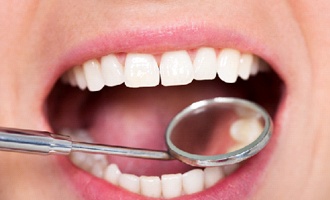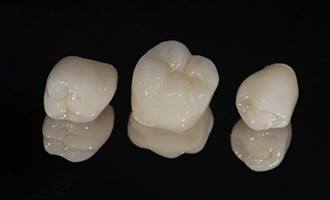Dental Crowns – Westminster, CO
Strong, Beautiful Restorations For Damaged Teeth
What Is a Dental Crown?

A natural tooth has two main parts: the root and the crown. A dental crown, sometimes called a “cap,” is a type of dental restoration that fits over the entire crown of a tooth to repair any damage. We may recommend dental crowns in the following situations:
- When a tooth is already chipped or weakened by multiple fillings, a dental crown will strengthen it and prevent it from breaking further.
- If you have a large cavity that can't be repaired with a filling.
- After replacing a missing tooth with a single dental implant, it's restored with a dental crown.
- A crown may be a great choice for certain types of cosmetic work.
- A root canal removes the blood supply of a tooth, which makes it weaker and prone to breaking. A crown will restore the tooth's strength.
What Are Dental Crowns Made Of?

What Should You Do If You Break or Lose a Dental Crown?

The materials used for dental crowns not only look great but are very strong and durable as well. With basic maintenance, your crown can last 15-20 years and shouldn't break under normal circumstances.
- If you unknowingly bite down hard on something like an olive pit.
- If you chew on ice or use your teeth to open packages or bottles.
- If you clench and grind and don't wear a protective nightguard.
- If you don't keep the gumline around a dental crown clean with good brushing and flossing habits, a cavity can develop underneath it. This will weaken the crown and may cause it to become loose and fall off.
- If you frequently eat sticky foods like taffy, caramel, etc.
In the event that you do chip or break a crown, give us a call right away. You can cover any sharp edges with dental wax from the store until your appointment.
If a crown comes off entirely, call us to make the first available appointment. In the meantime, rinse the crown off (taking care not to drop it) and let it dry. Then you can use dental cement from the store, or a small dab of denture adhesive or even toothpaste in a pinch, to put it back on your tooth. However, make sure not to use any other type of glue or adhesive, which can damage both your natural tooth and the crown. Finally, chew on the opposite side until your appointment with us.
How much does a Dental Crown cost?

A dental crown has many different uses; it can repair a tooth that’s been damaged by cavities or physical trauma, but it might also be used to improve the appearance of your smile. But how much will the procedure cost? The answer depends on a several different variables. Here are 4 things to keep in mind when figuring out the ultimate price of your dental crown.
1. Material of Dental Crowns
A dental crown can be made of several different materials depending on your needs. Examples include:
- Gold crowns, which tend to be stronger and more durable than other crowns but also tend to stand out in your smile.
- All-porcelain crowns, which are the most natural-looking replacements for front teeth and tend to be more popular for patients worried about appearances.
- Porcelain fused to metal crowns, which combines the strength of the metal with the aesthetics of the porcelain.
In general, porcelain fused to metal crowns tend to be the least expensive while all-porcelain crowns tend to be more costly, and the price of gold crowns will usually be somewhere in between. Of course, prices vary, so you should check with your dentist first.
2. The Treatment Before You Receive Your Crown
In many cases, you might receive a crown as part of another treatment; as such, the price of the other procedure will need to be considered. Most of the time, crowns are placed after you receive root canal treatment (to protect the remaining tooth structure) or dental implants (to serve as the actual replacement tooth while the implants act as roots). Furthermore, any consultation you have regarding tooth repair is likely to have its own cost.
3. Dental Insurance
If you are getting a crown as a restorative procedure, there is a good chance that your dental insurance will help you pay for it. Most plans are willing to provide up to 50% coverage of major procedures like crown placement (although you should confirm your benefits beforehand). Of course, you also need to consider your plan’s annual maximum and deductible, as that could potentially affect the amount your pay out of pocket.
4. The Need for Replacements
A dental crown won’t last forever; sooner or later, it needs to be replaced with a new one. The lifespan of a crown will depend on how well you take care of it. This is something to consider when determining the ultimate cost of a dental crown procedure.
Remember that in many cases, getting a dental crown is necessary to protect your damaged tooth as well as your overall oral health. Keep that in mind when looking at the cost of your restoration; it will always be better to choose the option that’s best for your smile and your bank account over the long term.
